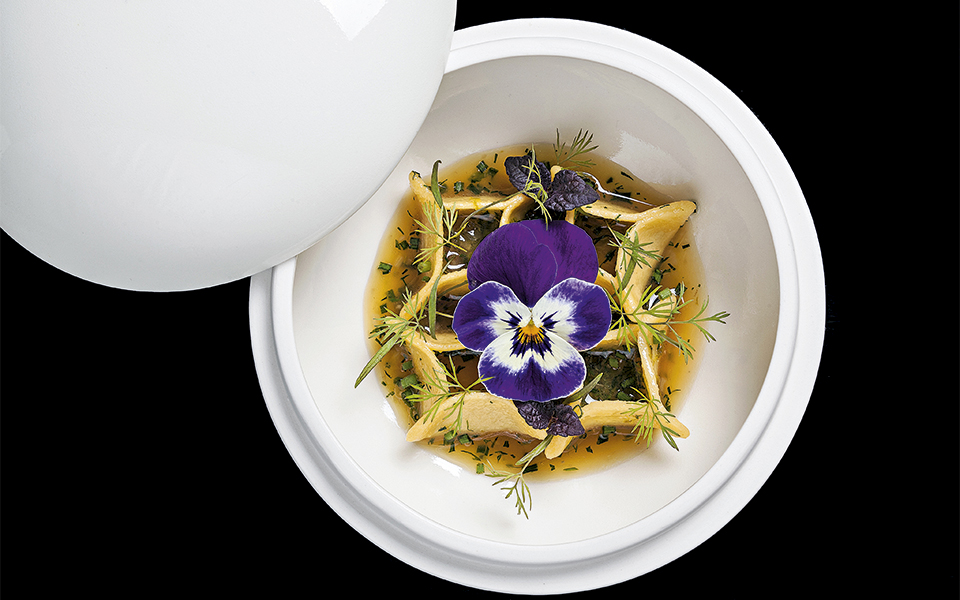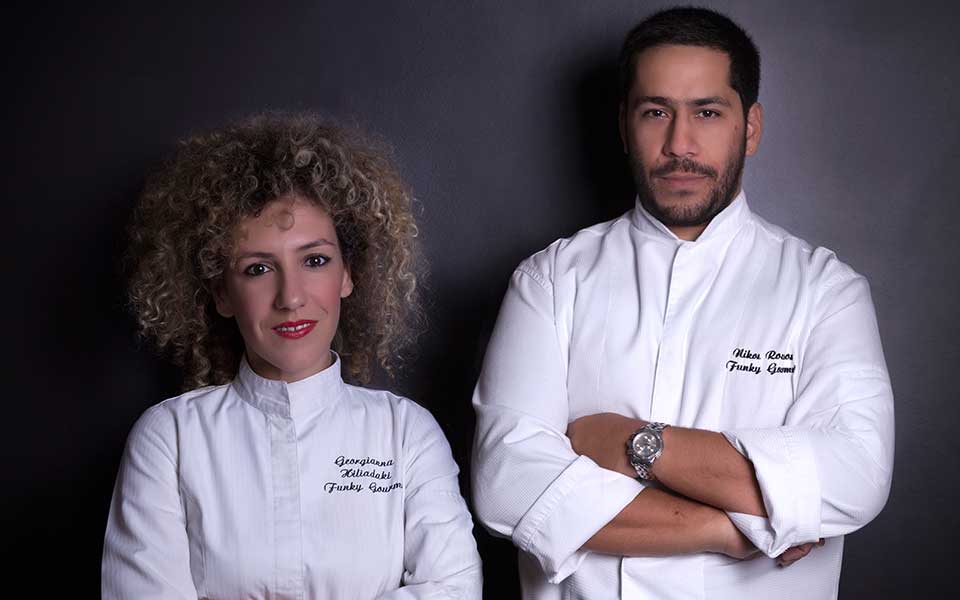
© Ioanna Pagalia
Georgianna Hiliadaki and Nikos Roussos – funkygourmet.com
“At Funky Gourmet, the overall experience is like an edible theatrical event: from the presentation of the dishes (a performance which stirs all the senses) to the choreographed service, which constitutes an inalienable part of this experience.”
Nine years ago, Georgianna Hiliadaki and Nikos Roussos opened the restaurant Funky Gourmet. They offer dishes inspired by tradition but presented in unconventional contemporary gastronomic forms characterized by finesse, complex techniques and a sense of humor. Their Greek salad is a white sorbet, their dolma takes such a minimalist abstract form that you won’t recognize it until you take your first bite, while their rabbit stew has no meat, only meat flavor, thanks to the highly concentrated stock.
Hiliadaki and Roussos are unique. They hold two Michelin stars as well as several other awards. They’re the Greek chefs best-known abroad, enjoying the recognition of both the public and the international culinary community. Ambassadors of contemporary Greek cuisine, they have two London businesses, too: the restaurant Opso and the street food eatery Pitta Bun. Every new step they take causes a stir.
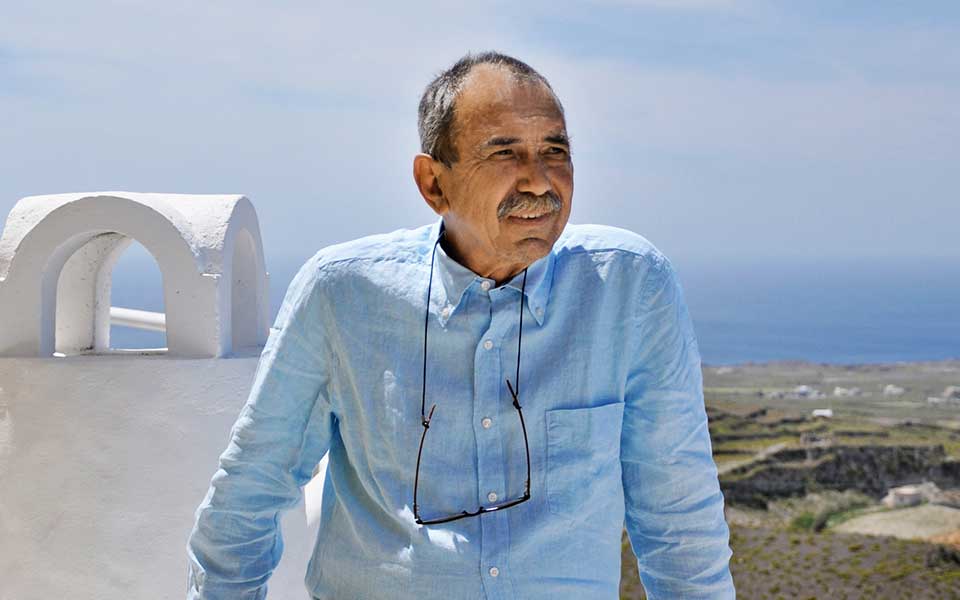
© Zoe Chatziyannaki
Yiorgos Hatziyannakis – selene.gr
“Greek cuisine is going through a phase of redefinition. Local cuisines mutually influence one another, and the chefs’ techniques add depth to the flavors. Tourism is the ultimate judge of the Greekness of a dish. Everything intermixes. It is absolutely possible to have a great cuisine, unless, of course, the notorious ‘national genius,’ in its most negative sense, were to regain the upper hand.”
Yiorgos Hatziyannakis is the man who established Santorini as a gastronomic destination. He was also the first to serve local produce and bottled Assyrtiko wine to the relatively few visitors who came to the island in the 1980s. His restaurant celebrated the very soul of Santorini’s local gastronomy, the humble products yielded by the island’s soil: yellow split peas; small, “waterless” tomatoes; sweet white eggplants; wild capers; and the great Assyrtiko grape, thus raising local cuisine to gourmet standards.
In this way, he built an enviable reputation and created great culinary expectations among the island’s visitors. Thirty-two years later, and his award-winning restaurant Selene still has a distinct character and identity, a clear sense of direction when it comes to creativity, and it remains the top choice for an unforgettable gastronomical experience on the island.
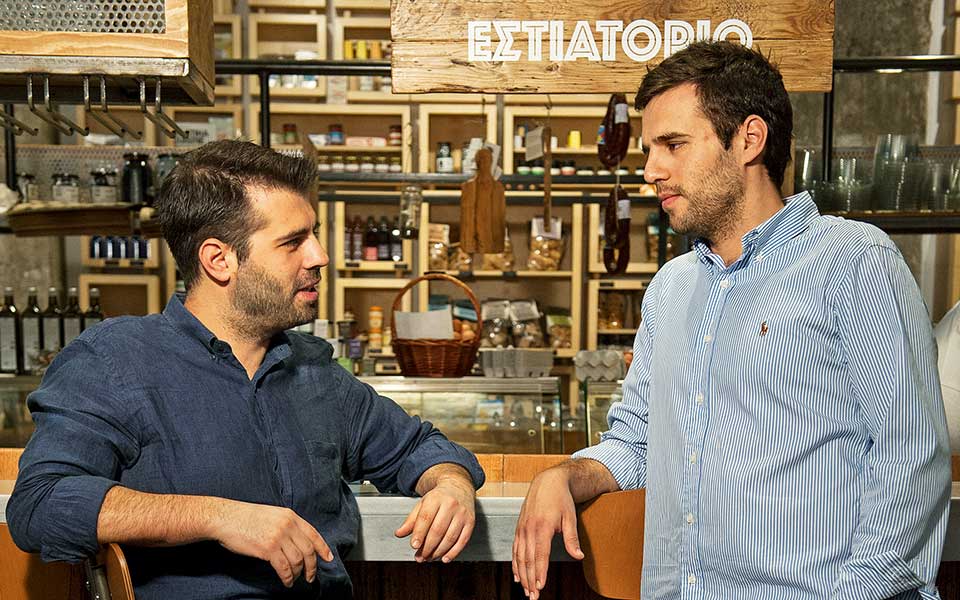
© Alexandros Avramidis
thomas and george douzis – ergonfoods.com
“The dish that summarizes the Ergon philosophy is our ‘Greek salad,’ which is a best seller at all our stores, from Santorini to London and Singapore. The way in which our chefs have redefined it without sacrificing any part of its identity is superb. It contains Cretan baby plum tomatoes, cucumber, roasted peppers, feta cheese from Lesvos, extra fine virgin olive oil and Kalamata olives, all served on a grilled pita bread.”
It all started with one small grocery shop in Thessaloniki. There, the Douzis brothers, motivated by a highly innovative spirit and having the energy of youth on their side (neither had yet turned 30), began to market products from small producers using modern, high-quality packaging. By doing so, they contributed significantly to making Greek goods better known beyond the country’s borders. A little later, they brought back, in a more modern version, the concept of the grocery/eatery that had disappeared decades earlier from the big cities.
On the shelves of Ergon stores, one can find delicacies and fine primary ingredients from across the country. With the same ingredients, they cook traditional Greek dishes in their restaurants, albeit with creative twists. Through franchising, they have expanded the Ergon network significantly, which means that, at key tourist destinations in Greece, London, Brussels, the US and Singapore, locals and visitors can sample Greek cuisine in the same place where they can shop for traditional Greek products, such as olive oil, feta cheese and yogurt, Cretan rusks, honey, honey and sesame bars, sesame rings and vanilla fondant spoon sweets.
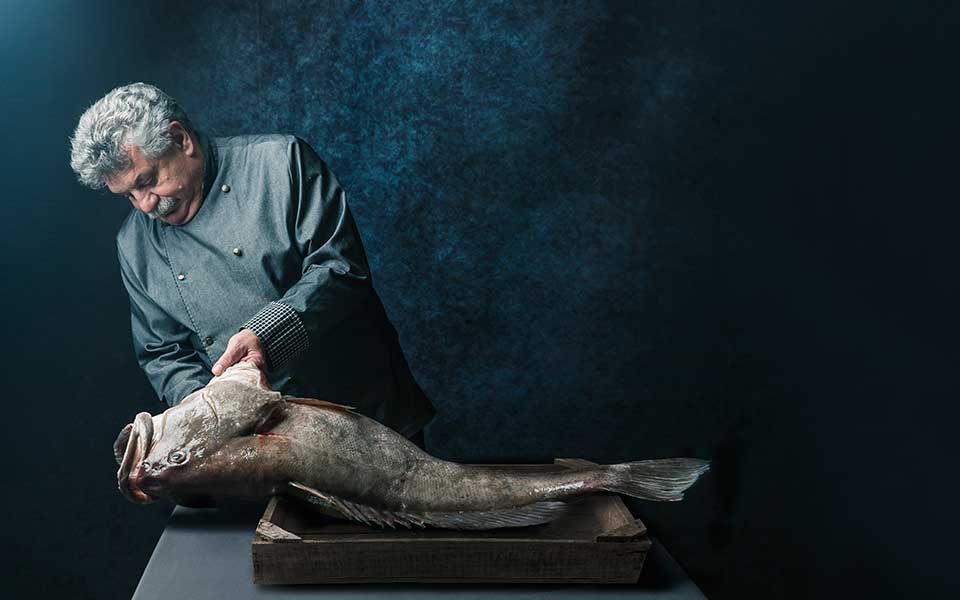
© Dimitris Vlaikos
LEFTERIS LAZAROU – varoulko.gr
“For me, Greek cuisine is the showcasing of a primary ingredient by creating recipes that use our traditions and οur fine products to their best advantage, in order to put the country on the world gastronomy map. Through the dishes produced at Varoulko over the past 31 years, my aim has been always to present a new way of cooking that marries the present with the past. Traditional cuisine can become modern through knowledge and dedication, as long as we do not stop learning and evolving, always seeking out everything new and good that our country produces, and using it generously in our cooking.”
Lefteris Lazarou began his career working as a cook on commercial ships. Very soon, however, his name became synonymous with fine seafood dishes. The first chef to receive a Michelin star for a restaurant serving Greek cuisine, Lazarou exploits the high quality of Greek fish to produce contemporary, creative dishes, often using less popular species in groundbreaking recipes.
It was at his restaurant, Varoulko that Athenians tasted squid with pesto sauce for the first time, as well as orzo with shrimp, graviera cheese and wine from Limnos. Today, Varoulko Seaside in Piraeus continues to maintain a consistently high standard and a strong reputation. An award-winning eatery, it’s unquestionably one of the best places for dining in Athens.
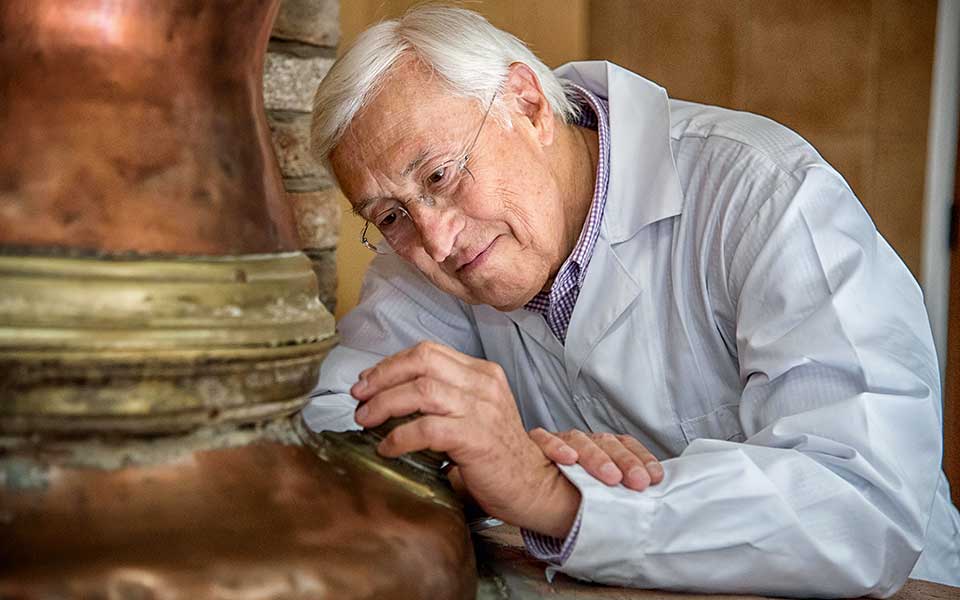
NIKOS KALOGIANNIS – ouzoplomari.gr
“Greek cuisine is something more than its traditional dishes. It’s a gathering of people connected by friendship and love. Besides the unquestionable value that it holds for the simplicity of its flavors and ingredients, Greek cuisine will always provide people with the excuse to communicate, discuss, relax, have a laugh and strengthen their ties around a table.”
The scent of anise has been steeped into his clothes. A fifth-generation distiller, he literally grew up inside the family business. Today, Nikos Kalogiannis is at the helm of the largest Greek ouzo distillery. From the home of our national drink, the seaside town of Plomari on Lesvos, his company Ouzo of Plomari – Isidoros Arvanitis exports to more than 40 countries.
Kalogiannis has created the first premium ouzo, called Adolo, which is triple distilled. Thanks to this new recipe, the humble ouzo of the traditional kafeneio now has a place next to other noted spirits and has even managed to make it into classic cocktails at top bars. Moreover, Kalogiannis has invested in single-variety tsipouro, something which, in turn, has helped high-quality Greek spirits gain access to the international drinks scene, at a time when Greek bartending is increasingly outward-looking.

© Dimitris Vlaikos
STELIOS PARLIAROS – steliosparliaros.gr
“Traditional Greek pastry-making has changed, thanks to new people constantly entering the field, with the knowledge, willingness and dedication to bring about a new order of things. My childhood memories, filled with wonderful treats, challenge me to constantly create new desserts. It is tradition itself that guides me to that which is contemporary, which has evolved and is different and yet also possesses roots and history. And I firmly believe that only when something has history can it also have a future.”
The most important Greek pastry chef, Stelios Parliaros has created many contemporary trends in baking and pastry-making. Born in Istanbul, he came to Athens about 40 years ago and later opened a pastry shop that instantly became the talk of the town. Prior to the early 1980s, no one in the capital had exhibited such talent or had his deep mastery of technique, his focus on seasonality or his playful, creative spirit.
Fruit tarts, airy mousses and French profiteroles were only some of his most famous desserts in a city that was used to baklava and spoon sweets. He published the first magazine dedicated to pastry-making, runs a pastry shop and pastry workshop in Kolonaki and presents a TV program. Parliaros continues to experiment with traditional Greek recipes, producing exceptional new desserts.

© Dimitris Vlaikos
PARIS SIGALAS – sigalas-wine.com
“Because of its various microclimates and the limited total surface of arable land, Greece is destined to yield products whose competitiveness does not rely on their low cost but on their uniqueness and the particular character traits that the place where they are produced gives them. Greek cuisine is characterized by simple compositions whose aim is to showcase the primary ingredients (namely seasonal produce), which are always both special and of a high quality, the most basic constituent being, of course, Greece’s outstanding olive oil.”
In Santorini, where ancient vines have traditionally been trained into low basket-shaped arrangements, Paris Sigalas insisted instead on experimenting with linear vineyards and new plantings. He was the first to plant upright vines, and was labeled a heretic as a result. Two decades later, linear alignments are used in other vineyards, suggesting that he might have been right after all.
For years now, he has been insisting on financial arrangements that favor local grape producers, which indicates the importance he places on the raw materials for his wines. Sigalas was the first winemaker to price his products at a grand cru level, declaring that Assyrtiko should be considered a premium wine. In addition to significant vinifications using Assyrtiko grapes, he has also performed wonders with the Mavrotragano variety, rescuing it from near-extinction and highlighting its spectacular potential.
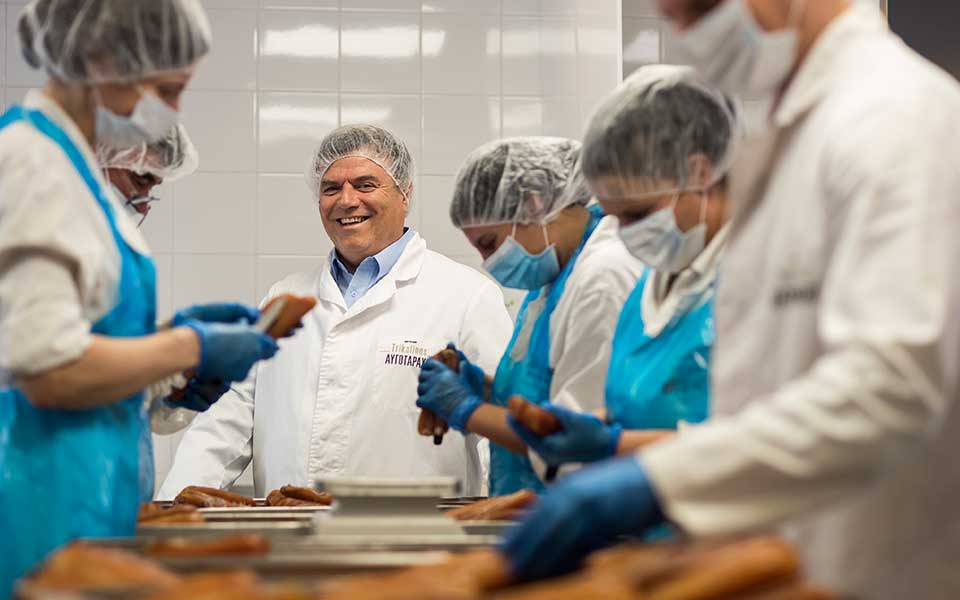
© Thaleia Galanopoulou
ZAFEIRIS TRIKALINOS – trikalinos.gr
“Greek cuisine is important, not only from the gastronomic point of view, but also in terms of dietary value. The true definition of a gourmet is someone who wishes to enjoy the tastiest foodstuffs available. He may choose to eat a humble fasolada (bean soup), a classic Greek dish, and to accompany it with marinated sardines or he might decide to eat a rye rusk with fresh cheese and fresh almonds. That, too, is ‘gourmet’ food. It’s tasty and, what’s more, it’s also nutritionally valuable.”
Following the family tradition, Zafeiris Trikalinos went into the avgotaracho (bottarga) business in a small village near Messolongi, where, in 1865, his great-grandfather, Giorgos Trikalinos, began producing avgotaracho from the eggs of the grey mullet. Apart from its beneficial properties, this delicacy, which is only produced in limited amounts, constitutes a particularly tasty treat and, in the hands of famous chefs, becomes an interesting, if unusual, primary ingredient.
The pioneering Ferran Adrià, one of the most influential chefs in the past few decades, has included Trikalinos bottarga in his list of the 30 best products in the world, while the award-winning Roca brothers of the Celler de Can Roca in Girona, Spain, use it in their highly imaginative culinary compositions. Trikalinos, a fourth-generation producer, invests continuously in research, promoting and funding projects related to bottarga and its gastronomic potential.
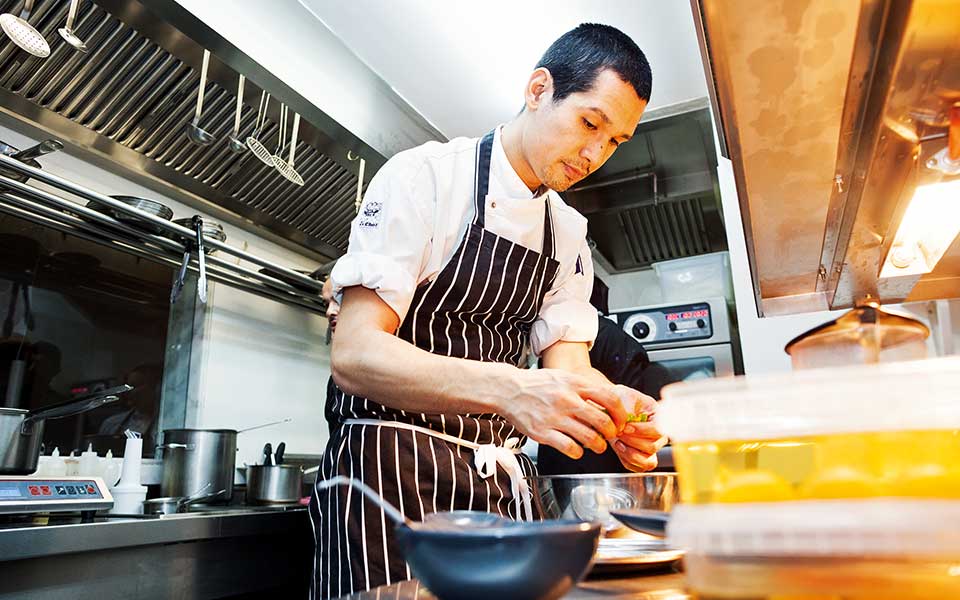
SOTIRIS KONTIZAS – nolanrestaurant.gr
“For me, Greek cuisine is Sunday lunch with my parents and grandparents all sitting around the table. Of course there have to be salads, feta cheese and olives at the center of the table, and a casserole dish or baking tray with ladera, oven-baked vegetables in olive oil. And plenty of bread!”
An award-winning chef and a judge on the reality TV show MasterChef Greece, Greek-Japanese Sotiris Kontizas is one of the country’s most important cooks. Two years ago, at the age of just 33, he created a brand-new, particularly interesting cuisine that no one has yet managed to categorize. His work at the restaurant Nolan has been honored with several different awards, including distinctions for fusion cuisine, ethnic cuisine and international cuisine.
Kontizas combines Greek and foreign products, employing techniques and recipes from both Asia and Greece, and using only seasonal ingredients. Noodles are served with a tahini sauce, zucchini is combined with miso paste and smoked eggplant; a very mature, rare cheese from Naxos is added to seared cabbage. His dishes are noted for strong elements of surprise, harmonic contrasts and innovative ideas, which explains why Nolan has been fully booked since the day it opened.
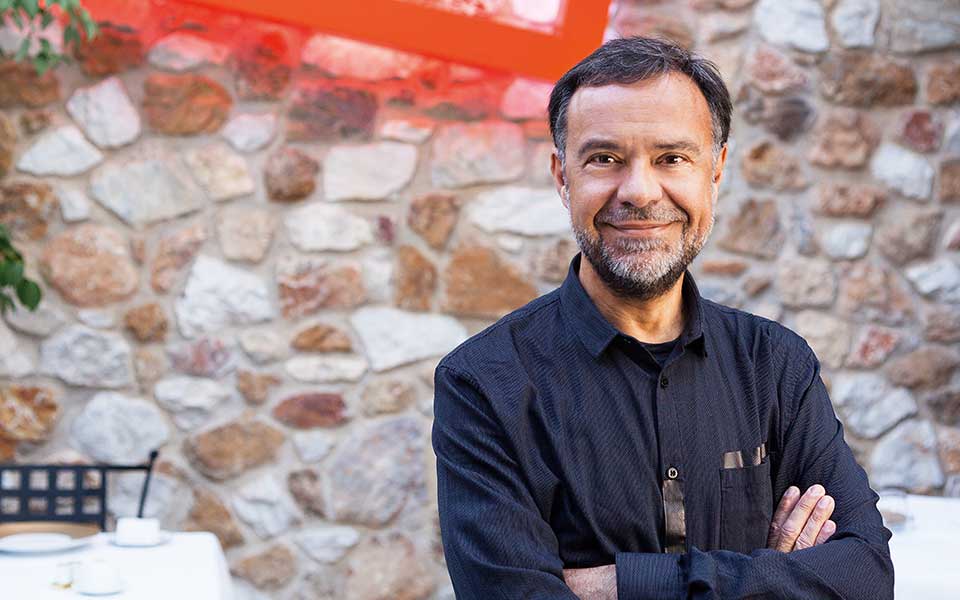
© Doc TV Specialists
APOSTOLOS TRASTELIS – spondi.gr | hytra.gr | fugarestaurant.gr
“Greek cuisine for me is the smell of a wood-fired oven, the headscarf-wearing village aunt kneading dough by hand, the mixing of the ingredients in a ceramic bowl, the sorting of the eggs just collected from the chicken coop, the homemade bread on the table. Greek cuisine is not gourmet, and it should never become that. What should be perfected is the execution, the techniques adopted in each recipe. In this way, and by using high-quality main ingredients, every dish in traditional Greek cuisine is automatically raised to a higher level.”
Taken together, the business ventures of Apostolos Trastelis hold the highest number of Michelin stars in the country. The opening in 1996 of the stellar Spondi, his multi-award-winning restaurant, redrew the gastronomic map of Athens. He introduced new techniques, brought great chefs to the city and raised the bar in the food business. Aesthetic quality, authenticity and the highest standards of cooking have kept it at the top of the rankings for more than two decades.
Trastelis has also found other outlets for his creavity. Fuga, his restaurant at the Athens Megaron Concert Hall, serves a delicious combination of Asian, Latin American and Mediterranean flavors. Michelin-starred Hytra, on the 6th floor of the Onassis Cultural Center in Athens, focuses on a particularly creative version of local gastronomy that includes notable Greek products and aromatic herbs and uses advanced culinary techniques. For example, the spinach rice, a traditional dish, has been transformed into a crispy rice chip without losing any of its essential Greek taste.
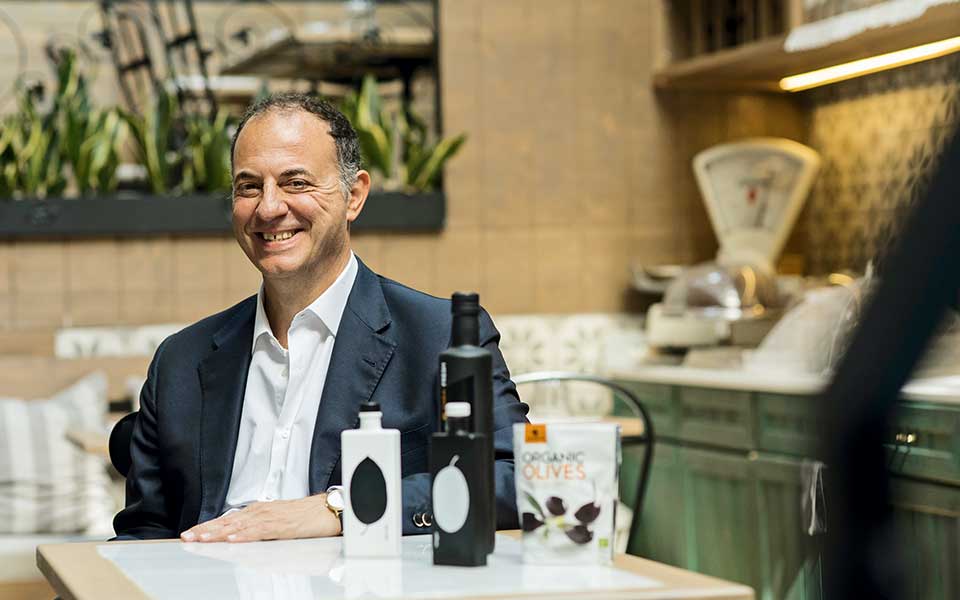
© Dimitris Vlaikos
ARIS KEFALOGIANNIS – gaea.gr
“The advantages of Greek products are derived from what sets them apart: their flavors and aromas, the native varieties used to produce them, the microclimate, the limited production which, in most cases, lies in the hands of a family business. They also arise from a particular understanding of innovation that respects tradition. They possess a high nutritional value, and enjoy the popularity of the Greek Mediterranean Diet, the healthy nature of which has been established by many studies, with olive oil playing the leading part.”
When Aris Kefalogiannis set up GAEA in 1995, his vision was to make high-quality Greek products known abroad. He was relying on the relative superiority of Greek olive oil and olives. He stressed the connection between the health benefits from Greek olive oil and table olives on the one hand and the Mediterranean Diet and a healthy way of life on the other, a factor which helped the international recognition of products sold under the label “Made in Greece.”
In collaboration with the National Technical Univeristy of Athens, Kefalogiannis created innovative packaging for his products. GAEA was, in fact, the first company worldwide to achieve standardized packing of olives without the use of liquids, preservatives or thermal processing, thus offering to the international market a tasty, high-quality Greek product in its most unadulterated form. Today, he works in direct collaboration with Greek producers mainly in PDO regions. GAEA’s Extra Virgin Olive Oils are the first carbon-neutral olive oils worldwide. The company exports goods, all of which are produced from Greek raw materials, to 27 countries around the globe.

© Yiorgos Kaplanidis
STELLIOS BOUTARIS – kiryianni.gr
“On a table set for foreign friends, I’d place different things depending on season and location. On the estate, we offer ‘winegrower’s elevenses’ −tomatoes, spring onions, olives, bread and more. If I were in the Cyclades, it would be sea urchin salad, tomatoes with cloves, octopus with yellow split pea purée. At the mountain village of Nymfeon, it would be pan-fried cheese, lamb with parsley, and pork with leeks. On Diaporos Island, it would be oven-baked sardines. And, of course, some delicious bottled Greek wine!”
Stellios Boutaris comes from the largest winemaking family in Greece. He is a fifth-generation wine producer working with one of the most characteristic Greek varieties, namely Xinomavro of Naoussa, as well as other grapes. Boutaris, who exports to Europe, the US and Asia, is considered one of the main players in this new era for Greek wine.
During the first five months of 2016, the winery Kir-Yianni received 29 international distinctions for its Xinomavro wines, both for varietals and for blends. Last year, the estate, founded in 1997, made the Wine & Spirits list of the 100 world’s best wineries. Boutaris is considered something of a marketing wizard. Every wine comes with an interesting story; he introduced storytelling as an indispensable promotion tool, which helped the estate gain international recognition and reinforce the reputation of Greek wine at the same time.

